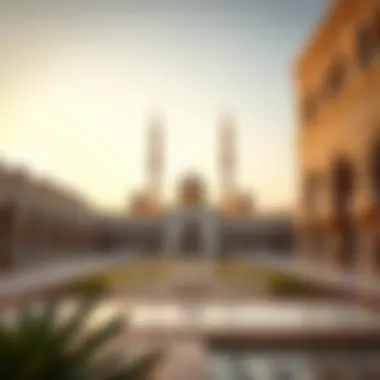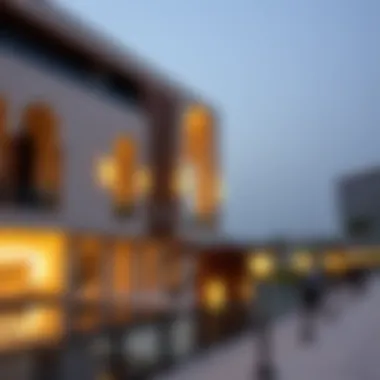Understanding Ramadan's Start Date in the UAE for 2023


Intro
As the crescent moon reappears in the sky, its significance echoes through the hearts and minds of millions, marking the commencement of Ramadan. In the UAE, this month carries profound correlation with tradition, spirituality, and community, shaping not just individual lives but also influencing various sectors including the economy and real estate.
In 2023, understanding when Ramadan begins is not merely a matter of religious observation; it holds economic repercussions, particularly for those tuned into the nuances of the Dubai real estate market. The Islamic calendar's reliance on lunar cycles means that every year, the start date of Ramadan shifts, creating a need for adaptability among investors, homebuyers, and realtors.
This article seeks to dissect the antecedents surrounding the start date of Ramadan in the UAE. From local customs intertwined with this sacred month to the ripple effects that resonate throughout the business landscape, we aim to provide readers with not only a thorough comprehension but also actionable insights for navigating these unique dynamics.
Foreword to Ramadan
Ramadan is more than just a month on the Islamic calendar; it is a deeply significant period that is observed by millions worldwide. For people residing in the UAE, Ramadan is a time of reflection, community, and spirituality. Understanding Ramadan not only encompasses its religious aspects but also its social, cultural, and economic implications, particularly in a diverse nation like the UAE, known for its harmonious blend of traditional values and modern lifestyles.
In this article, we will peel back the layers of Ramadan, focusing on its importance in the context of the UAE. The insights provided will serve as a guide to help navigate this transformative month.
Significance of Ramadan
The significance of Ramadan extends beyond mere fasting. It's a month of self-discipline, empathy, and spiritual growth. Originally established as a time to commemorate the first revelations received by the Prophet Muhammad, Ramadan serves as a reminder to the faithful about the core values of their faith — patience, gratitude, and generosity.
Through fasting from dawn to sunset, individuals not only refrain from food and drink but also engage in self-reflection and enhanced devotion to religious practices. This deep-seated spiritual commitment encourages stronger bonds with one's community and promotes acts of charity.
Moreover, Ramadan is an opportunity to develop a heightened sense of social responsibility, directing attention towards those less fortunate. It acts as a catalyst, uniting families and friends with communal prayers and shared meals, fostering a strong sense of belonging.
Cultural Practices in the UAE
Culturally, Ramadan in the UAE is a vibrant tapestry woven from Emirati traditions interlaced with influences from the many cultures present in the country. It’s common to see Iftar, the evening meal breaking the fast, becoming a communal affair where families gather and share enormous platters of food. From dates and water to hearty dishes like Mandi and Harees, the breaking of the fast becomes not just a meal but a celebration.
During this month, the streets are illuminated with decorations, and cultural activities are abundant, adding to the atmosphere of joy and togetherness. The Taraweeh prayers, a special nightly prayer, invite individuals to come together in mosques, fostering community spirit.
Furthermore, many restaurants offer special Iftar buffets, and it’s customary for employers to adjust working hours — often reducing them to accommodate the fasting schedule. This considers the physical toll fasting can have and aims to create a more conducive work environment.
In essence, understanding cultural practices in the UAE during Ramadan offers a window into the rich traditions that define this sacred month. It is crucial for investors and real estate professionals to recognize these cultural nuances as they navigate the local market during this significant time.
Understanding the Lunar Calendar
Understanding the lunar calendar is essential for grasping the intricacies of Ramadan's commencement in the UAE. The Islamic calendar, which is based on lunar cycles, is notably different from the solar calendar most of the world uses. This divergence has pivotal implications for religious observances, cultural practices, and even market dynamics. As investors and homebuyers alike prepare for the holy month, recognizing how these lunar months are structured can aid significantly in planning activities and strategies.
The lunar calendar comprises twelve months, totaling around 354 to 355 days in a year. This is shorter than the solar calendar by approximately ten to eleven days. Thus, each year, Ramadan shifts back on the Gregorian calendar. This year, understanding when the moon is sighted not only shapes personal spiritual practices but also affects broader societal behaviors, such as working hours and retail priorities.
For those navigating the real estate landscape during this time, it’s crucial to consider how the fluctuations of the lunar calendar and its observances like iftar meals influence market momentum, community engagements, and buyer behaviors.
How Lunar Months are Determined
The determination of lunar months is quite straightforward but holds deep significance. Each month commences with the sighting of the new moon. Traditionally, this is done through direct visual observation by qualified individuals. While astronomical calculations can predict lunar cycles, many communities still prefer the traditional sighting method as it holds cultural and religious weight.
As a result, the start of each lunar month can vary slightly between regions. This doesn't only affect the date marking the start of Ramadan but also touches on local practices, community communications, and how businesses project their operations.
Key Aspects In Lunar Month Determination
- Traditional Moon Sighting: Relies on human observation, often varying from one country or city to another, fostering a sense of local community across the UAE.
- Astronomical Calculations: Provides a frame, but the gap between calculated versus observed dates can lead to differences in the commencement of Ramadan across different regions.
- Cultural Influences: Emphasizes the importance of community involvement during sighting, reinforcing unity and shared experiences within groups prior to Ramadan.
The Role of Moon Sighting


Moon sighting plays an instrumental role in determining the onset of Ramadan. For many, it’s a spiritual endeavor that goes beyond mere calendar marking. It’s a practice steeped in tradition that resonates deeply within the hearts and minds of the community.
The accomplishment of sighting the moon is often celebrated and can sometimes lead to public gatherings, reinforcing cultural values and beliefs. In the UAE, officiated by religious authorities, when the crescent moon is spotted, announcements quickly follow suit, making this a time of great anticipation and excitement.
The traditional practice of moon sighting not only signifies the start of Ramadan but also acts as a communal bonding experience that transcends individual practices.
Considerations Regarding Moon Sighting
- Religious Adherence: There’s a profound reverence surrounding the sighting; it is part of the Islamic creed and connects believers back to the roots of their faith.
- Community Engagement: Local communities often gather to witness the sighting, enhancing social ties and fostering community spirit.
- Market Impact: The timing of announcements regarding moon sighting can influence consumer behavior. Investors in the UAE need to be prepared for fluctuations in market dynamics that coincide with the onset of Ramadan, affecting retail sales and property interests.
In summary, comprehending how lunar months are defined and why moon sighting matters is crucial from a cultural and practical standpoint. Just as importantly, investors and homeowners should consider these elements to stay ahead during Ramadan's unfolding.
Ramadan Start Date for
In the realm of Islamic practice, the start date of Ramadan holds profound significance. For 2023, this date symbolizes more than just the commencement of fasting; it affects various sectors, including culture, real estate, and even daily routines in the United Arab Emirates. Understanding this start date is crucial for investors, homebuyers, and real estate professionals, as it sets the tone for market activities and social engagements that unfold throughout the month.
Determining when Ramadan begins can impact the buying and selling behavior in real estate. Awareness of this period allows investors to align their strategies with when potential buyers or renters are more engaged. Moreover, knowing the start date also helps businesses prepare for an influx of consumers looking for products and services aligned with Ramadan's observances, such as special food offerings or community events. Thus, the Ramadan start date is not merely a calendar point but a pivotal marker influencing various facets of life in the UAE.
Calculated Start Date
For 2023, the calculated start date for Ramadan falls around March 23. This date is reached by following the lunar calendar, accounting for variations based on moon sightings. The anticipation surrounding Ramadan involves much speculation during Shaban, the month preceding Ramadan, where discussions bloom regarding when fasting will begin.
It’s important to note that the lunar calendar does not align perfectly with the Gregorian calendar, typically yielding shorter months. This shifting nature means that calculations can sometimes mislead, underscoring the need for official announcements.
Some local authorities might suggest a start date based on the moon's predicted appearance, yet confirmation from religious bodies occurs through actual sightings. Therefore, while calculations give a ballpark figure, the official start of Ramadan hinges on verified observations, often leading to slight adjustments in timings as communities await confirmation. This mixture of science and tradition creates an environment of shared anticipation as families prepare.
Official Announcements and Variations
As Ramadan approaches, official announcements play a vital role in clarifying the date. The UAE's moon-sighting committee is responsible for declaring when Ramadan truly begins, usually the evening prior. This procedure is steeped in tradition and is followed by communities who come together in observance and respect.
"Ramadan is a time not only for fasting but also for reflection, prayer, and community. The start date announcement is a moment that unites everyone in meaningful anticipation."
Moreover, variations can occur. For example, if the crescent moon is not sighted one evening, Ramadan may start a day later. This variability requires adaptability from businesses and individuals alike. It is not uncommon for differences in start dates to emerge in neighboring countries due to variances in moon sightings, leading to discussions about unity and divergence across the regions.
Understanding these processes aids real estate investors in anticipating the best timing for investments, marketing strategies, and client engagements during this period. Keeping an eye on official announcements not only aligns expectations but also allows for proactive planning amid a culturally significant month.
Impact on Daily Life
Understanding the start of Ramadan holds significant weight, particularly for those living and engaging in the UAE. The shifts that occur during this month go beyond just spiritual observances; they ripple through various aspects of daily existence affecting everything from working hours to social gatherings. For investors, homebuyers, and real estate professionals alike, comprehending these changes is crucial for navigating the unique opportunities and challenges that arise during this holy month.
Changes in Work Schedules
As Ramadan begins, many companies adjust their working hours, catering to the needs of employees who fast. Typically, the standard work schedule may shift from the usual morning hours to shorter days. This can mean a start time around 10 AM, with work wrapping up by 3 PM in many sectors. Such adjustments aim to accommodate those who are fasting, allowing them the chance to break their fast at sunset without the distraction of ongoing work responsibilities.
"Flexibility is the name of the game during Ramadan; it's a time when employees appreciate understanding from their employers."
This change can inherently impact productivity and business operations, especially for sectors catering to local consumers, such as retail and hospitality. Stakeholders must be mindful of these shifting schedules when planning meetings or deadlines during the month.
Adjustments in Retail and Dining


The impact of Ramadan echoes throughout the retail and dining sectors as well. Restaurants usually undergo operational changes, transitioning from typical daytime service hours to focusing on iftar—the meal to break the fast—beginning at sunset. You might notice that many dining establishments roll out festive menus, featuring traditional dishes that entice patrons.
- Some key aspects include:
- Extended evening hours for dining to accommodate iftar and suhoor (pre-dawn meal).
- Promotional offers, such as iftar buffets or meal deals to draw in customers.
- Adjusted product offerings highlighting traditional food and beverages.
From a real estate perspective, many retail spaces may experience a surge in foot traffic during evening hours. This could be an excellent opportunity for investors and property managers to explore new leasing arrangements or marketing strategies that cater to the festive season.
Social Gatherings and Community Activities
Ramadan is not just a time for personal reflection but also one for forging connections within the community. Families gather for iftar dinners, and it's not uncommon to see neighbors exchanging food or hosting large communal meals. Such traditions underline the importance of community bonding during this season.
In addition to family get-togethers, mosques often hold various events aimed at enhancing spiritual growth and charity. Activities such as educational talks or communal prayers can invite various segments of society to engage and participate in the spirit of Ramadan. This increase in community interaction can be vital for professionals in the real estate market, emphasizing a community-focused approach to development.
In summary, recognizing how Ramadan alters daily life in the UAE is not just about acknowledging a religious observance; it’s about understanding the broader implications for work, retail, and community dynamics. For those in the real estate sector, this period presents a unique intersection of culture and market opportunity.
Impact on the Real Estate Market
The impact of Ramadan on the real estate market in the UAE is significant and multifaceted. This month-long period, characterized by reflection and community involvement, brings about various shifts in consumer behavior, which investors and realtors need to consider. Understanding these dynamics can equip real estate professionals and buyers with vital insights to make well-informed decisions during this time.
When Ramadan sets in, the changes in market activity are palpable. With families coming together for iftar meals and communal prayers, societal routines adjust. The creation of a family-centric environment means that potential buyers may prioritize homes that accommodate larger gatherings and promote community engagement. This trend can ripple through the real estate market, making properties with spacious kitchens and dining areas particularly appealing.
Furthermore, it is critical to keep in mind that the demand for real estate often fluctuates during Ramadan. Some buyers may pause their searches, as the month is one of introspection and spiritual growth. However, savvy investors can take advantage of quieter market conditions, potentially leading to better negotiation opportunities.
In summary, Ramadan is not merely a time for personal growth; it's also a period that can shape market trends in unique ways. By thoroughly understanding these shifts, stakeholders can align their strategies accordingly.
Market Trends during Ramadan
During Ramadan, the real estate market in the UAE exhibits distinct trends that deserve close attention.
- Leisure Focus: Many people prefer staying at home to break fast with loved ones, leading to increased interest in properties with outdoor spaces, swimming pools, or community amenities.
- Availability of Time: Following the adjustment of work hours, many professionals find themselves with more time to explore properties. This change opens the door for increased foot traffic at showrooms and open houses, despite the holidys.
- Virtual Tours Gain Traction: Given the communal prayers that often fill the evenings, property showings may take on a virtual dimension, allowing flexibility for those observing the fast.
Real estate professionals should brace for varied patterns in buyer engagement as they strategize their marketing approaches. This month can open opportunities for those willing to adapt to Ramadan's unique dimensions.
Opportunities for Investors and Buyers
Amidst the nuances of the Ramadan period, there exist several opportunities for investors and homebuyers alike. The savvy minds in real estate know that with challenge comes potential. Here are a few key opportunities:
- Negotiation Leverage: As the number of active buyers may decline, there can be less competition for desirable properties. Investors may find that sellers are more willing to negotiate prices and terms during this time, which can ultimately lead to advantageous purchase agreements.
- Market Entry Points: For those looking to invest in the UAE real estate market, Ramadan can serve as an excellent entry period. Developers may release new projects that coincide with the month, catering specifically to the family-oriented nature of the holiday.
- Awareness of Community Designs: Ramadan highlights the importance of community in the UAE. Investors may capitalize on this by focusing on properties in developments that prioritize communal spaces or facilities that encourage family interaction.
"The month of Ramadan opens a multitude of avenues, provided one is open to the changing tides of demand and supply in the real estate landscape."
For further understanding of market trends and buying strategies during Ramadan, resources can be found at Wikipedia, Britannica, and other relevant sources.
Health Considerations during Ramadan
During Ramadan, a month of fasting and reflection, the approach to health can shift dramatically. As Muslims refraining from food and drink between dawn and sunset, understanding the health implications becomes crucial, not only for personal well-being but also for community harmony. This section looks at two essential aspects: nutrition and physical activity.


Nutrition and Meal Preparation
In the context of Ramadan, what we eat and how we prepare our meals can significantly impact our health. After a long day of fasting, the body craves nourishment, but it is vital to make healthy choices. Breaking the fast traditionally begins with dates and water, which offer a quick source of energy without overwhelming the digestive system. Here are a few key points regarding nutrition during Ramadan:
- Balanced Meals: It’s important to focus on having a variety of nutrients to ensure that the body gets the energy needed throughout the day. Meals should ideally include a mix of carbohydrates, proteins, healthy fats, and plenty of fruits and vegetables.
- Hydration: Drinking enough water during Suhoor (the pre-dawn meal) and after Iftar (the meal to break the fast) is crucial. Insufficient hydration can lead to fatigue or headaches.
- Avoiding Processed Foods: While it’s tempting to indulge in rich and processed foods, they are often high in calories but low in nutrients. Opt for whole foods that provide long-lasting energy.
- Meal Planning: Preparing meals ahead of time can help ensure that you make nutritious choices rather than rushing to meet cravings or convenience.
Putting thought into meal preparation doesn’t just make breaking the fast more enjoyable; it’s essential for maintaining optimal energy levels throughout the fasting month.
"Eating wisely during Ramadan can transform our health both physically and mentally."
Physical Activity and Energy Levels
With the shift in daily routine during Ramadan, maintaining physical activity is often a challenge. Yet, physical health is deeply intertwined with overall well-being, making this an area worth paying attention to. Here are some considerations:
- Timing of Exercise: For many, exercise is easier to fit into the schedule after Iftar, when energy levels are higher. Engaging in light to moderate exercise post-meal, such as walking or light resistance training, can aid digestion without overwhelming the body.
- Energy Management: Fasting can temporarily lower energy levels, but this doesn’t mean one should forego activity altogether. Short, less intense workouts can be beneficial, especially when the body is adequately fueled.
- Listening to One’s Body: Everyone reacts differently to fasting, and it’s important to pay attention to how the body feels. If fatigue sets in, it may be wise to prioritize rest over a demanding workout.
- Benefits of Physical Engagement: Moderate activity can enhance mood, improve metabolism, and strengthen relationships, especially when done as a community, like group walks or sports activities.
Maintaining a focus on both nutrition and physical activity not only aids health during Ramadan but also emphasizes the importance of self-care amidst the holy month’s spiritual journey. This balance can pave the way for a spiritually fulfilling experience, allowing one to thrive both physically and mentally.
Reflections on Spirituality
Ramadan goes beyond mere fasting; it serves as a mirror reflecting one’s spirituality. This period encourages believers to engage in introspection, allowing them to renew their faith and enhance their understanding of life. Its significance extends into various aspects of daily life, from practice to personal growth. Within the context of this article, the exploration of spirituality during Ramadan is vital for understanding its holistic impact on individuals and communities across the UAE.
Personal Growth during Ramadan
The month of Ramadan invites individuals on a journey of self-discovery. It acts as an annual checkpoint for many Muslims, allowing them to evaluate their personal goals and spiritual ambitions. The practice of fasting, which is abstaining from food and drink from dawn to sunset, fosters a unique discipline that can translate into various life areas. Such a mindset shift encourages:
- Self-Discipline: Resisting physical temptations can bolster mental strength. This can lead to maintaining healthier habits post-Ramadan.
- Reflection and Mindfulness: Engaging in reflective practices, such as daily prayers and meditation, helps individuals center their thoughts and promote mental well-being. Using this time for self-reflection leads one to establish clearer personal and spiritual goals.
- Gratitude: Fasting offers a relatively straightforward approach to understand the struggles of others, fostering a sense of empathy and appreciation for one's own blessings.
These elements work in tandem to foster a profound sense of personal evolution. For investors or professionals in the real estate market, understanding this personal development during Ramadan becomes essential, as it influences how individuals perceive their luxury living spaces and community connections.
Community Bonding and Charity
Social interconnectedness is often emphasized during Ramadan, making it an ideal time for community bonding and charitable deeds. The spirit of giving, or Zakat, thrives during this time, encouraging individuals to share their wealth and resources with those less fortunate. This collective consciousness provides several benefits:
- Strengthened Ties: Ramadan encourages gatherings that can lead to stronger relationships. Whether it’s community iftars (the meal breaking the fast) or prayers held in mosques, these interactions strengthen bonds.
- Collective Charitable Efforts: Many residents participate in charitable activities, emphasizing collective responsibility. Organizations often coordinate initiatives to provide meals to the needy or fund educational projects—these serve to unite neighborhoods.
- Encouragement of Volunteering: Acts of service enhance a sense of purpose among individuals. Many take the opportunity to volunteer in soup kitchens or shelters, creating a shared goal of kindness.
"Ramadan is not just a month of fasting; it’s also a month of togetherness and shared purpose."
In regard to the business landscape, understanding the effects of these social shifts can offer insights into emerging trends and community needs. Professionals who recognize the importance of fostering community relations during this month can tap into a wellspring of goodwill, which is beneficial for client relationships and project development.
As we delve deeper into the concept of spirituality during Ramadan, it’s clear that both personal growth and community bonding are intertwined. They shape the unique character of the UAE's society during this sacred month, ultimately influencing how people engage with their faith, each other, and their environments.
The End
The end of this article encapsulates vital insights regarding the start of Ramadan in the UAE, shedding light on its multifaceted significance for individuals and sectors alike. Ramadan is not merely a month of fasting; it serves as a catalyst for personal evolution, community engagement, and economic dynamics.
Final Thoughts on Ramadan in the UAE
As we reflect on the implications of Ramadan, several elements stand out that warrant further consideration:
- Spiritual and Personal Growth: Many utilize this time for self-improvement and deeper connections with faith. Engaging in prayer and reflection becomes paramount, impacting mental and emotional Well-being.
- Community Bonding: Ramadan fosters a sense of unity. Neighborhoods come alive with families breaking their fasts together. This vibrant atmosphere promotes social ties and cultivates a spirit of generosity, encouraging acts of charity.
- Economic Impacts: For investors and businesses, understanding Ramadan's timing can influence market behavior significantly.
- Sales Trends: Retailers might find that consumer spending shifts during the month, particularly in food and apparel. Knowing when Ramadan starts allows businesses to adapt marketing strategies accordingly.
- Real Estate Movements: Potential homebuyers and realtors should consider the fluctuations in buyer behavior. Often, property transactions can see slowdowns or surges based on timing within Ramadan.
In summary, comprehending the significance of Ramadan's start date unveils pathways for enriched experiences and informed decision-making, particularly for stakeholders within the real estate and business sectors. Staying attuned to the nuances of this holy month is crucial for anyone looking to navigate the landscape of the UAE effectively. Consider this rich, communal time not merely as a seasonal shift but as an opportunity for holistic engagement. By acknowledging and embracing these insights, one can better appreciate the transformative power of Ramadan.















